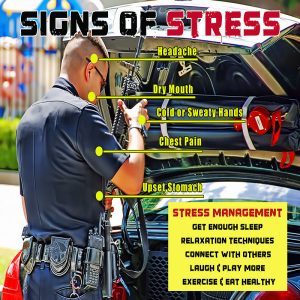Police Officer: Stress Management Advice
 Dr. Michelle Beshears
Dr. Michelle Beshears
One of the biggest problems for police officers is that stress can go unrecognized and unacknowledged. Officers are under constant stress and do not take the time to seek treatment. Many times they deny the stress they are experiencing for fear of being viewed as weak or not being able to handle their job.
At some point, everyone feels stressed. But for police officers, who are in positions of authority and making life and death decisions on a regular basis, stress can have a major negative impact on their lives.
What Causes Stress?
Police officers face many different types of stress. According to the National Institute of Justice, the following are work-related and individual factors that are likely to cause stress and fatigue in law enforcement officers.
Work-related factors are caused by:
- Poor management
- Inadequate or broken equipment
- Excessive overtime
- Frequent rotating shifts (Here’s why agencies should consider 10-hour shifts to save money and reduce stress.)
- Regular changes in duties (For example, officers often spend one day filling out paperwork and the next intervening in a violent domestic dispute.)
Individual factors include:
- Family and relationship problems
- Financial problems
- Health concerns
- Difficulties from working second jobs to make extra income
Even more specifically, police officers are likely to be stressed by the daily responsibilities that come with the job. According to the article, “Police Stress: Identifying & Managing Symptoms of Stress,” these stresses are caused by:
- Constant exposure to people suffering distress and pain
- Threats to an officer’s safety or health
- The responsibility of protecting the lives of citizens
- Having to be in control of emotions even when provoked
- The inconclusive nature of police work
- The quickly alternating pace of the job (situations can escalate rather quickly in this line of work)
- The responsibility of owning a firearm
Consequences of Stress
Just as in any profession, untreated stress can lead to serious consequences. These consequences not only affect the individual officer, but also those with whom the officer has daily contact, such as colleagues, supervisors, friends, family, and the public.
According to “On-the-Job Stress in Policing: Reducing It, Preventing It,” some of the more common consequences of job-related stress reported by police officers are:
-
- Cynicism and suspiciousness
- Emotional detachment from various aspects of daily life
- Reduced efficiency
- Absenteeism and early retirement
- Excessive aggressiveness (which may trigger an increase in citizen complaints)
- Alcoholism and other substance abuse problems
- Marital or other family problems (for example, extramarital affairs, divorce, or domestic violence)
- Post-traumatic stress disorder
- Heart attacks, ulcers, weight gain, and other health problems
- Suicide
How to Reduce Stress
The good news is that the importance of reducing job-related stress is not going unnoticed by agencies and even the highest level of federal government. In fact, the federal government responded to this problem in the 1994 Omnibus Crime Act where the president and Congress recognized the severity of the problem and mandated a federal government response. As a result of this legislation, the National Institute of Justice was assigned the task of sponsoring research on police stress, establishing pilot programs to help officers and departments deal with police stress, and conducting program evaluations on current programs in an effort to support state and local efforts.
American Military University faculty members Mark Bond, Matt Loux, and Dr. Shana Nicholson have written several articles about how police officers can reduce stress specific to police work. Law enforcement officers can reduce stress by:
- Planning meals and making healthy eating choices. Stop eating high-calorie fast food.
- Scheduling vacations and personal downtime.
- Seeing your doctor regularly for checkups.
- Sharing the workload and reducing the amount of overtime.
- Living within your financial means so that “moonlighting” with a second job is not necessary.
- Creating a realistic exercise program and forming healthy habits to get regular exercise.
- Creating a “Patrol Buddy” program and make time to check on each other.
- Keeping your civilian friends to help you get away from the job. If you socialize with police friends, make a point not to talk about work on your downtime together.
How to Manage Your Stress
Not all stress is bad. In fact, it can be positive. It can help officers get out of dangerous situations and it can also motivate individuals to achieve. However, too much stress can affect your emotional and physical well-being and can cause significant problems in your life at home, work, and school. Fortunately, if you are experiencing negative stress in your life there are ways in which you can effectively manage it.
An important way to manage stress is through effective time management. Consider:
- Taking the time to work out a plan to ensure there is a balance in your life.
- Setting aside specified times for your responsibilities.
- Setting goals for yourself and avoiding procrastinating.
- Ensuring you get enough sleep and limiting your use of caffeine.
- Being conscious of your limits and only setting realistic goals.
- Setting aside time for exercise and leisure activities.
- Having a good attitude and finding the upside to whatever situation life might throw at you.
These are just a few suggestions. Your situation is different and as unique as you are. There are some circumstances in which this might seem impossible, but the key is to keep moving forward and to remain as positive as possible.
Stress is common in all of our lives, but as long as we look for ways to effectively manage it and seek help when we feel we are not able to, we can make it through. Many times, we find ourselves coming out of a stressful situation stronger than before. The most important thing is to recognize when you feel stressed and work to identify what is causing it. Once stress is acknowledged, officers can work to effectively manage it and not let it consume their lives.

About the Author: Michelle L. Beshears earned her baccalaureate degrees in social psychology and criminal justice and graduate degrees in human resource development and criminology from Indiana State University. She most recently completed her Ph.D. in Business Administration with a specialization in Criminal Justice. Michelle served in the U.S. Army for 11 years. She obtained the rank of Staff Sergeant prior to attending Officer Candidate School at Fort Benning, Georgia where she earned her commission. As a commissioned officer she led numerous criminal investigations and worked with several external agencies as well. As a civilian, she has worked with the local sheriff’s department, state drug task force and FBI. Michelle is currently an assistant professor of criminal justice at American Military University and is full-time faculty in the School of Security and Global Studies.

